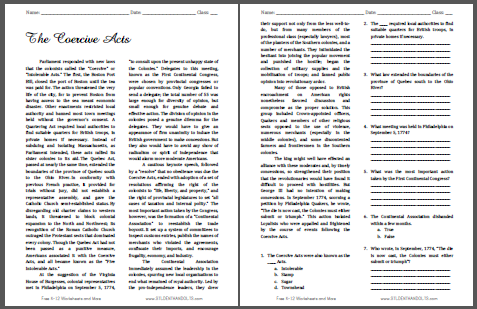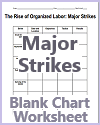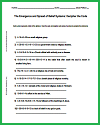The Coercive Acts |
 Parliament responded with new laws that the colonists called the "Coercive" or "Intolerable Acts." The first, the Boston Port Bill, closed the port of Boston until the tea was paid for. The action threatened the very life of the city, for to prevent Boston from having access to the sea meant economic disaster. Other enactments restricted local authority and banned most town meetings held without the governor's consent. A Quartering Act required local authorities to find suitable quarters for British troops, in private homes if necessary. Instead of subduing and isolating Massachusetts, as Parliament intended, these acts rallied its sister colonies to its aid. The Quebec Act, passed at nearly the same time, extended the boundaries of the province of Quebec south to the Ohio River. In conformity with previous French practice, it provided for trials without jury, did not establish a representative assembly, and gave the Catholic Church semi-established status. By disregarding old charter claims to western lands, it threatened to block colonial expansion to the North and Northwest; its recognition of the Roman Catholic Church outraged the Protestant sects that dominated every colony. Though the Quebec Act had not been passed as a punitive measure, Americans associated it with the Coercive Acts, and all became known as the "Five Intolerable Acts."
Parliament responded with new laws that the colonists called the "Coercive" or "Intolerable Acts." The first, the Boston Port Bill, closed the port of Boston until the tea was paid for. The action threatened the very life of the city, for to prevent Boston from having access to the sea meant economic disaster. Other enactments restricted local authority and banned most town meetings held without the governor's consent. A Quartering Act required local authorities to find suitable quarters for British troops, in private homes if necessary. Instead of subduing and isolating Massachusetts, as Parliament intended, these acts rallied its sister colonies to its aid. The Quebec Act, passed at nearly the same time, extended the boundaries of the province of Quebec south to the Ohio River. In conformity with previous French practice, it provided for trials without jury, did not establish a representative assembly, and gave the Catholic Church semi-established status. By disregarding old charter claims to western lands, it threatened to block colonial expansion to the North and Northwest; its recognition of the Roman Catholic Church outraged the Protestant sects that dominated every colony. Though the Quebec Act had not been passed as a punitive measure, Americans associated it with the Coercive Acts, and all became known as the "Five Intolerable Acts."At the suggestion of the Virginia House of Burgesses, colonial representatives met in Philadelphia on September 5, 1774, "to consult upon the present unhappy state of the Colonies." Delegates to this meeting, known as the First Continental Congress, were chosen by provincial congresses or popular conventions. Only Georgia failed to send a delegate; the total number of 55 was large enough for diversity of opinion, but small enough for genuine debate and effective action. The division of opinion in the colonies posed a genuine dilemma for the delegates. They would have to give an appearance of firm unanimity to induce the British government to make concessions. But they also would have to avoid any show of radicalism or spirit of independence that would alarm more moderate Americans. A cautious keynote speech, followed by a "resolve" that no obedience was due the Coercive Acts, ended with adoption of a set of resolutions affirming the right of the colonists to "life, liberty, and property," and the right of provincial legislatures to set "all cases of taxation and internal polity." The most important action taken by the Congress, however, was the formation of a "Continental Association" to reestablish the trade boycott. It set up a system of committees to inspect customs entries, publish the names of merchants who violated the agreements, confiscate their imports, and encourage frugality, economy, and industry. The Continental Association immediately assumed the leadership in the colonies, spurring new local organizations to end what remained of royal authority. Led by the pro-independence leaders, they drew their support not only from the less well-to-do, but from many members of the professional class (especially lawyers), most of the planters of the Southern colonies, and a number of merchants. They intimidated the hesitant into joining the popular movement and punished the hostile; began the collection of military supplies and the mobilization of troops; and fanned public opinion into revolutionary ardor. Many of those opposed to British encroachment on American rights nonetheless favored discussion and compromise as the proper solution. This group included Crown-appointed officers, Quakers and members of other religious sects opposed to the use of violence, numerous merchants (especially in the middle colonies), and some discontented farmers and frontiersmen in the Southern colonies. The king might well have effected an alliance with these moderates and, by timely concessions, so strengthened their position that the revolutionaries would have found it difficult to proceed with hostilities. But George III had no intention of making concessions. In September 1774, scorning a petition by Philadelphia Quakers, he wrote, "The die is now cast, the Colonies must either submit or triumph." This action isolated Loyalists who were appalled and frightened by the course of events following the Coercive Acts. |
| Click here to print. Answer Key: (1) A - Intolerable, (2) Quartering Act, (3) Quebec Act, (4) First Continental Congress, (5) the formation of a "Continental Association" to reestablish the trade boycott, (6) B - False, (7) George III. |
Text courtesy of the U.S. State Department, Bureau of International Information Programs, 2005 |












